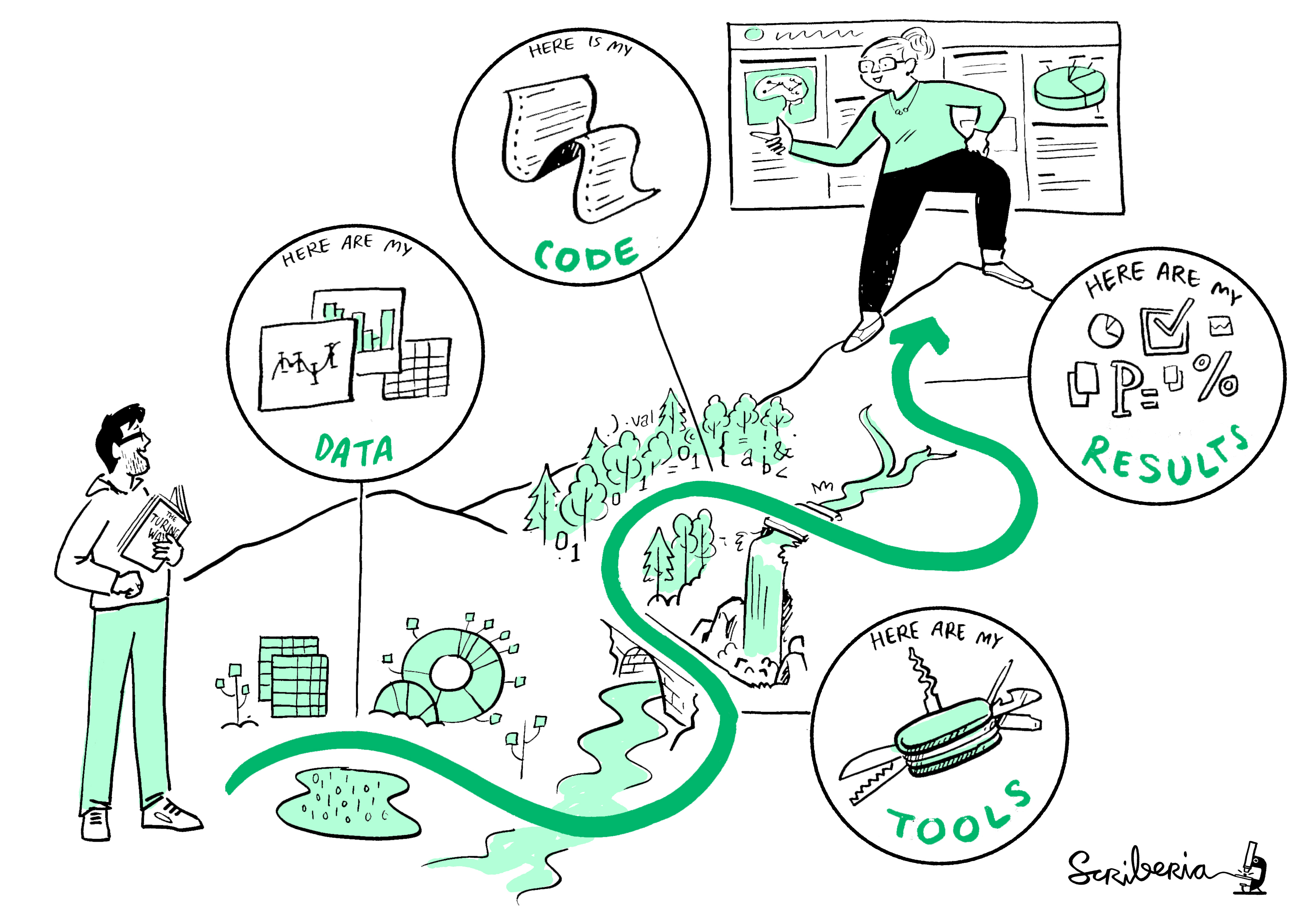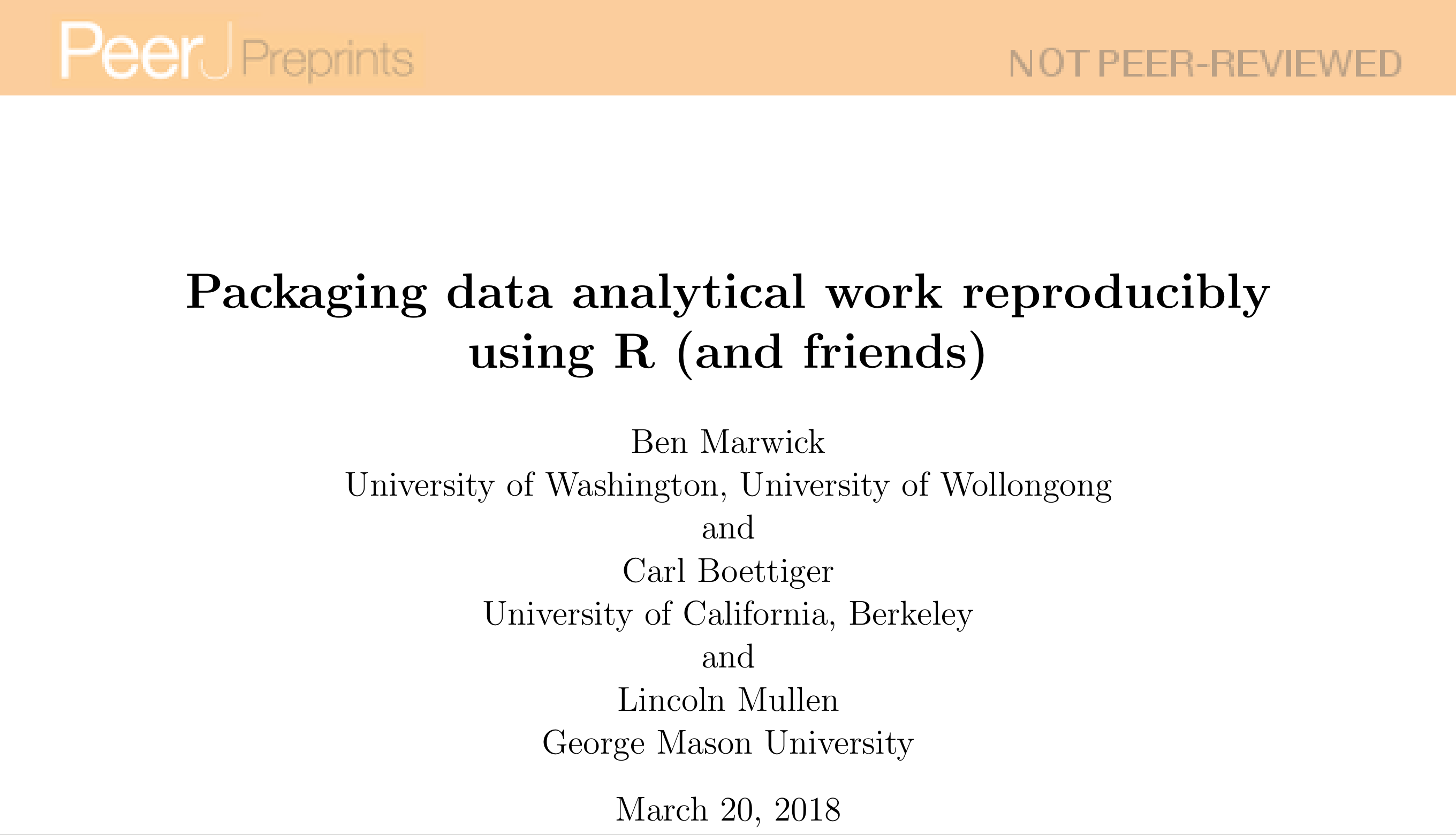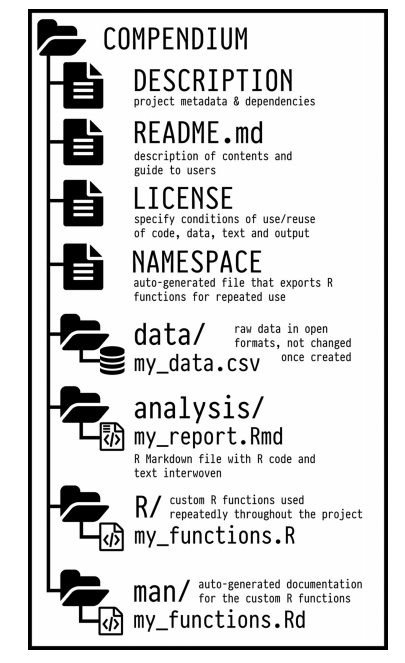class: center, middle, inverse, title-slide # Reproducible data analysis ## R packages as research compendia ### Sebastian Hanß and Selina Baldauf ### May 2020 (updated 28 June, 2021) --- <style type="text/css"> .large { font-size: 130% } .small { font-size: 70% } .tiny{font-size: 40%} </style> # Workshop overview .pull-left[  .left[.small[This image was created by [Scriberia](http://www.scriberia.co.uk/) for The Turing Way community and is used under a CC-BY licence (DOI [10.5281/zenodo.3332807](10.5281/zenodo.3332807)).]]] -- .pull-right[ ### Two main topics - Research compendia - R packages ### Resources - Code on github [https://github.com/selinaZitrone/YoMos2020](https://github.com/selinaZitrone/YoMos2020) - Slides on [https://selinazitrone.github.io/YoMos2020/index.html](https://selinazitrone.github.io/YoMos2020/index.html) - How-To on [https://selinazitrone.github.io/YoMos2020/how_to.html](https://selinazitrone.github.io/YoMos2020/how_to.html) ] --- # Motivations for a better project organization and workflow -- - Reproduciblity 🔃 (for you and others) -- - Reliablity 🏋 (will it work again?) -- - Re-usablity ⚙ (don't re-invent the wheel) -- - Visiblity 🔍 (let others see and use your work) --- # How? Use a research compendium! .pull-left[  .left[.small[This image was created by [Scriberia](http://www.scriberia.co.uk/) for The Turing Way community and is used under a CC-BY licence (DOI [10.5281/zenodo.3332807](10.5281/zenodo.3332807)).]] ] .pull-right[ > This is a collection of **all digital parts of a research project** including **data, code, texts (protocols, reports, questionnaires, metadata)**. The collection is created in such a way that reproducing all results is straight forward. (Definition from [The Turing Way](https://the-turing-way.netlify.app/afterword/glossary.html#term-Research-Compendia))<sup>1</sup> .footnote[ [1] [Excursion to the TTW website](https://the-turing-way.netlify.app/welcome.html) ] ] --- # What *is* a research compendium? .pull-left[ ### Principles - stick with the conventions in your field - Keep **data**, **methods** and **output** separate - specify the computational environment ] -- .pull-right[ ### Key components - License - VCS - Metadata - Archive ] .footnote[ from [Karthik Ram's talk at RStudio::conf 2019](https://inundata.org/talks/rstd19/#/0/3) ] ---  --- # It's an 📦 R Package! .pull-left[ .center[ ]] -- .pull-right[ - packages generating similar project directory structures: + `rrtools` + `ProjectTemplate` + `prodigenr` + `workflowr` ] --- # Advantages of using R Packages -- * benefit from quality control mechanisms built around R packages (<code>R CMD check</code>) -- * easy documentation -- * additional packages available to make your life easier + [`usethis`](https://usethis.r-lib.org/): workflow package to automate tasks like project setup etc. + [`pkgdown`](https://pkgdown.r-lib.org/): build a quick and easy website for your package + [`goodpractice`](https://github.com/mangothecat/goodpractice): gives you advice about good practices when building R packages + [`testthat`](https://testthat.r-lib.org/): add unit testing to your package + ... and many more --- class: inverse # Hands-on I ### Create a research compendium with the R package structure --- # Version control .center[] --- # Git as a distributed version control system (VCS) * complete and long-term history of every file in your project + go back to specific versions of your project * collaborate in teams + branching and merging + tracability: each change is commented and can be traced back to a developer * host your repository on remote server (GitHub, Bitbucket, GitLab, ...) + open-source collaborative development + visibility: get new collaborators, feedback, bug reports --- class: inverse # Hands-on II ### Add version control to the research compendium --- # Automated testing -- #### What? - *unit tests*: functions that run a small amount of code: "units" - input: defined and fixed - compares output with an expected output - returns true/false -- #### Why? - fewer bugs - better code (needs to be *testable*) - confidence and trust -- #### How? - write tests either before or after implementing your code - when you found a bug: before fixing, write a test that would have detected it - use a test framework, e.g. in R: [`testthat`](https://testthat.r-lib.org/) package (Hadley Wickham) --- class: inverse # Hands-on III ### Unit tests --- # Continous integration (CI) -- .pull-left[ > "If it hurts, do it more often" .right[(Martin Fowler)]  ] -- .pull-right[ ### Ideas - shared code repository (e.g. on github) - push code frequently (every day) - automated builds and tests after each commit - immediate feedback if something doesn't work anymore - however, can be time consuming and might be overkill for small or solo projects ] --- background-image: url('images/github-actions-with-text.jpg') background-position: 100% 50% background-size: 40% # Github Actions for CI (and other automation tasks) -- - supports mac-OS, windows, linux, docker containers -- - integration with github, so no separate setup and authentication -- - free for open source, academic or educational repos -- - 20 concurrent jobs (40 with pro), 6 h per job, 72 h per workflow -- - self host to remove the per job limit -- - very easy to setup with R using the <code>usethis</code> package .right[.footer[.small[This image was created by [Scriberia](http://www.scriberia.co.uk/)for The Turing Way community<br> and is used under a CC-BY licence (DOI [10.5281/zenodo.3332807](10.5281/zenodo.3332807)).]]] --- class: inverse # Hands-on IV ### Github Actions for `R CMD check` --- # Reproducibility and Accessability [Excursion to Karthik Ram's talk at RStudio::conf 2019](https://inundata.org/talks/rstd19/#/0/19) [Holepunch](https://karthik.github.io/holepunch/) --- class: inverse # Hands-on V ### Publish your repository on Binder with a live RStudio server instance